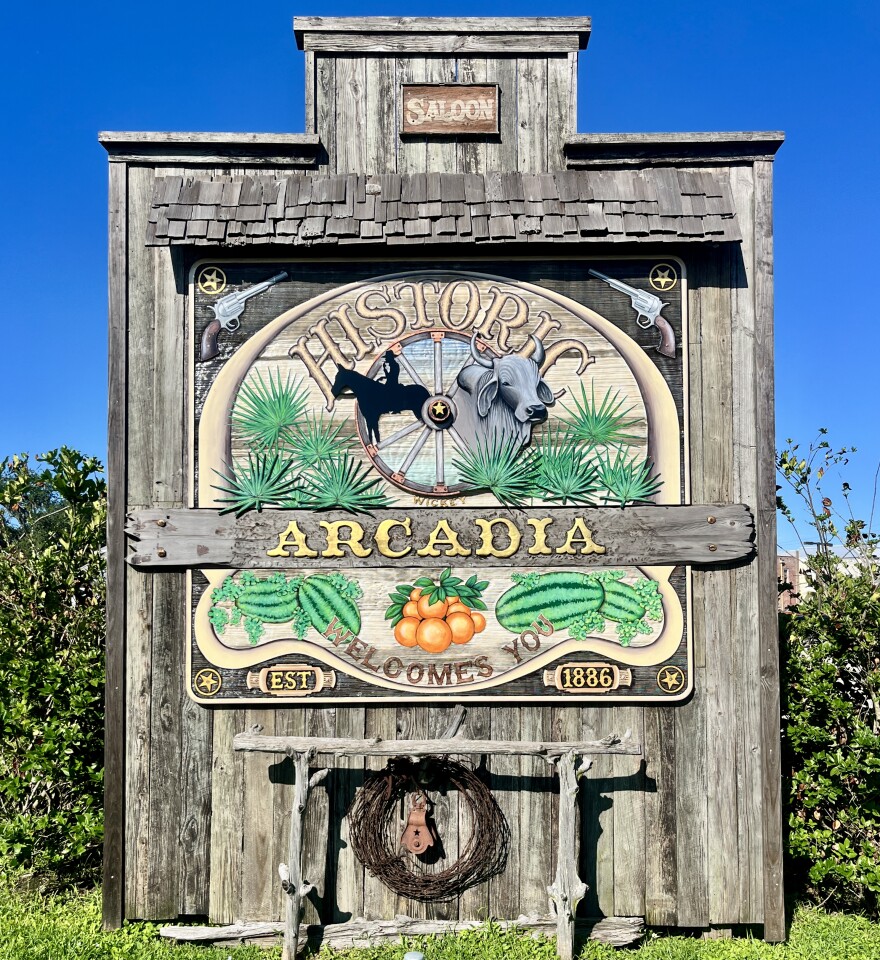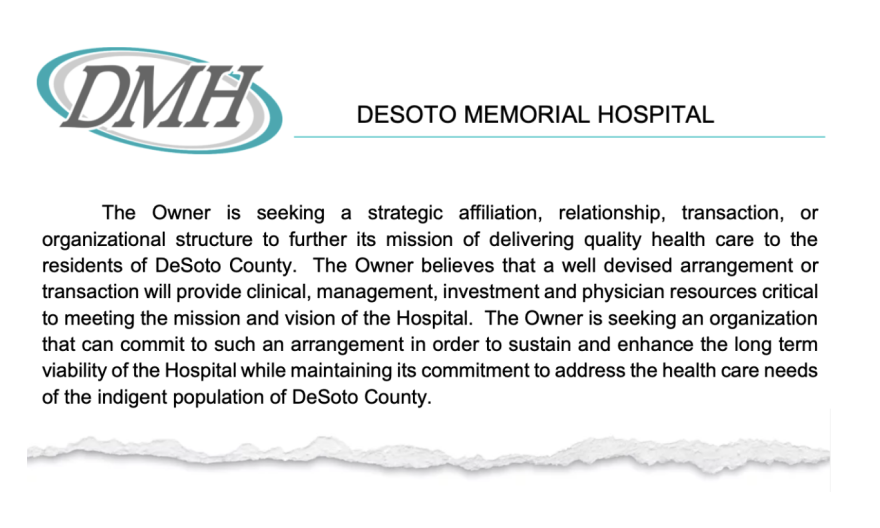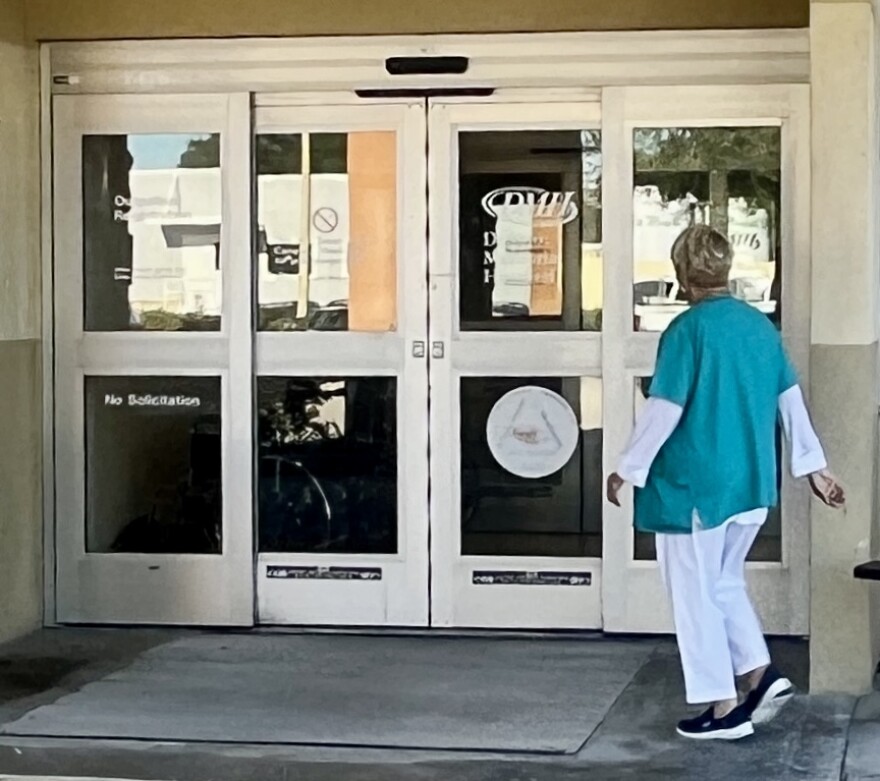In DeSoto County, where cattle pastures and orange groves stretch for miles and a shortage of doctors already strains access to basic care, the only hospital is weighing its future at a time of deep uncertainty for rural health care nationwide.
The 49-bed DeSoto Memorial Hospital in Arcadia issued a request for proposals that could lead to new ownership or outside control — just as looming Medicaid cuts and a wave of rural hospital closures leave communities like this one increasingly vulnerable.
The hospital’s RFP, which was first reported by The Arcadian, invites bids for a long-term lease, merger, joint venture, affiliation or outright sale to another health care organization. Proposals are due Oct. 1, and at least four health care organizations have requested tours since the request was published at the end of June.
The hospital will evaluate proposals based on what’s “in the best interest of the community” and how each plan would affect staff and the delivery of care, CEO Vince Sica said in an email to Suncoast Searchlight.
Sica said the move isn’t driven by an immediate crisis; talks began six months ago when a large health system approached the hospital about joining the organization. Still, the timing — coming just as Congress considered, and ultimately approved, steep cuts to Medicaid — underscores the growing pressure on small, rural hospitals and raises questions about how long facilities like DeSoto Memorial can remain independent.

President Donald Trump’s “Big Beautiful Bill” reduces Medicaid spending by $991 billion over 10 years, according to KFF. In the wake of the bill’s passage, worries of hospital closures have rippled across rural America, where high poverty means many residents use government insurance programs or are uninsured.
At DeSoto Memorial, about 1 in 5 five patients are covered by Medicaid, Sica said. A reduction of that revenue could exacerbate an already challenging economic landscape that includes rising costs, small population and a gap between the cost of care and insurance payments.
“There are very few independent rural hospitals in Florida and it is becoming more difficult to operate,” Sica said. “Supply costs are increasing, wages and salaries continue to increase, maintaining a productive staff is difficult in a rural location, (there is an) aging workforce and the cost of replacing capital equipment continues to rise.”
The hospital is not just a critical source of medical care in DeSoto County — it’s also one of the area’s largest employers, with a staff of roughly 200. In a community where economic opportunities are limited and many residents live below the poverty line, its future carries weight far beyond the emergency room.
“I would hate to see any of that affected,” said Arcadia City Council member Keith Keene, a former official with the Florida Department of Health.
Still, Keene said he understood the hospital board’s reasoning for considering a change: “I don't have mixed emotions about them doing that, because I really think through collaboration we are able to provide the best services for our community.”
The question of who will ultimately run the hospital comes as DeSoto County already grapples with limited access to care.
A recent report from the Health Planning Council of Southwest Florida identified DeSoto County as having a shortage of primary care providers, a mental health care shortage and a dental care shortage specifically affecting low-income and migrant farmworker residents.
Hospital board members did not return Suncoast Searchlight’s calls and emails seeking comment for this story. Neither did the other Arcadia City Council members or most DeSoto County Commissioners. Commissioner Judy Schaefer said she wasn’t aware of the request for proposals and did not have a comment on it.
Despite local support, DeSoto Memorial faces ongoing fiscal challenges
DeSoto Memorial stands on the northeastern edge of Arcadia, just before the town gives way to farmland and flat stretches of rural highway.
Constructed in the mid-1960s, the original facility has weathered hurricanes, economic downturns and decades of shifting health care policy — all while serving as the only hospital in a county of roughly 35,000 people.

Over the years, its footprint has expanded with modernized facilities and additional services, but its role in the community has remained the same: a place to treat emergencies and receive care without driving 30 or 40 miles. For many residents, it is the first call in a crisis.
DeSoto Memorial offers a broad range of medical services for a rural facility, including emergency care, respiratory therapy, diagnostic imaging, laboratory testing and an in-house pharmacy. But it lacks some of the medical specialties — like labor and delivery — typical of its larger peers. Merging with an outside organization could help attract specialists and a wider scope of care, hospital spokesperson Sarah Hipp told The Arcadian.
“It's a good hospital. They get good ratings,” said Mac Martin, a real estate agent in Arcadia, in an interview with Suncoast Searchlight. “Recently, my mother was there for a week and got excellent care.”
Local residents have long backed the hospital, both in spirit and at the ballot box. In 2014 — a decade after DeSoto Memorial received a $20 million USDA loan to rebuild following Hurricane Charley — voters approved a half-cent sales tax to help pay off the debt. The “indigent care” tax will expire once the mortgage is paid or in August 2036, whichever comes first. Hospital officials expect to pay it off in or before 2029.
Behind the scenes, though, the hospital’s financial footing has been uneven. It posted a $500,000 operating loss in fiscal year 2024, according to an independent audit report. That was an improvement from the previous year’s $3.6 million deficit, driven by an uptick in patients and reduced reliance on contract labor such as travel nurses.

Sica said it’s too early to tell how Medicaid cuts will affect hospital revenue going forward.
The federal spending bill included a $50 billion fund for rural hospitals and other rural health providers over five years. Half of that money will be allocated equally among states that successfully apply for it, apparently without regard to population, according to KFF. The rest will be distributed based on the discretion of administrators at the Centers for Medicare and Medicaid Services. There is no guarantee that the fund will continue after five years.
Even before the cuts, Medicaid payments only covered about 67% of DeSoto Memorial’s actual cost of services, according to the CEO.
“Over many decades, government health plans have consistently paid hospitals less than cost,” Sica said, referring to both Medicaid and Medicare payments.
That shortfall is among the reasons that independent physician practices have increasingly moved into hospital networks to stay afloat, according to Florida Hospital Association President and CEO Mary C. Mayhew.
“Many hospitals now, and most definitely rural hospitals,” said Mayhew, “they play this much more expansive role of preserving access to physician practices.”
But in rural communities, where patient volumes are low, it’s hard for hospitals to cover the cost gap through revenue from patients with private insurance.

In 2023, a greater share of rural hospitals had negative margins, compared with urban hospitals, according to KFF. Rural hospitals with at least 200 beds and high occupancy rates that were part of a bigger hospital system tended to have better finances than other rural hospitals.
And as Medicaid patients in DeSoto County and elsewhere lose coverage in the coming years as a result of federal policy, Mayhew said, hospitals are likely to see an increase in uninsured patients, which will increase charity care costs.
She said hospitals have seen skyrocketing labor and pharmaceutical costs since the pandemic, and supply costs could worsen with federal tariffs, as many pharmaceuticals and medical equipment come from China.
In Florida many hospitals are operating in the red or on razor-thin margins, Mayhew said. That affects what they can pay staff and invest into facilities.
“Those are the types of decisions that many small and rural hospitals have to contend with every single day as they try to manage a budget where you have two public payers, Medicare and Medicaid, who fail to cover the true cost of care,” she said.
The DeSoto Memorial Hospital board will hold a special public meeting to allow comments on the potential change to hospital management on Thursday, July 31 at 5:30 p.m. in the hospital’s McSwain room and on Zoom.
This story was produced by Suncoast Searchlight, a nonprofit newsroom of the Community News Collaborative serving Sarasota, Manatee, and DeSoto counties. Learn more at suncoastsearchlight.org.



